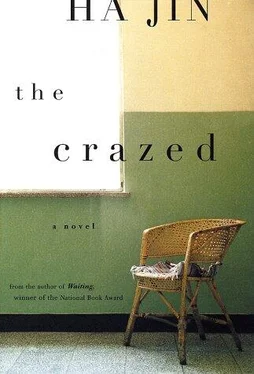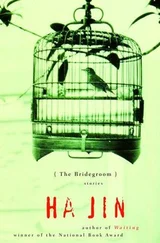Secretary Peng was also at the memorial service. I talked with her briefly and found out that she had seen my application for the position at the Policy Office, but the crematorium wasn’t a proper place to talk about such a matter, since I was obligated to keep Meimei and her mother company throughout the memorial service.
The day after the funeral, Meimei and I had a talk. We met in her father’s office, whose single window faced a huge weeping willow. I left the door ajar so that nobody could accuse me of using Mr. Yang’s office for smooching. Already there were grumbles in the department about my access to this office. In fact I seldom entered it these days. Some faculty members must have coveted this room, which was more spacious than theirs, and they were afraid I might occupy it permanently.
The heat coming in from the outside was palpable. Through the screen window the thrumming of cicadas could be heard, and from time to time a droning bee bumped into the iron mesh with a tiny thud. After Mr. Yang was hospitalized, I had kept everything in place here. His ink bottle, Plexiglas paperweight, tobacco box, and porcelain teacup all remained in their original places on his desk. On the wall, in the very place once occupied by Weiya’s painting of the smiley monk eating figs, now hung a large framed photo, in which Mr. Yang, wearing a huge red paper flower on his chest, was accepting an award for his scholarly accomplishment from the director of the Provincial Education Department. The prize was a bulky dictionary, Origins of Words, and a blue satin case containing a Hero fountain pen. On either side of the picture were two certificates pasted to the wall, commending his teaching. He had been elected an outstanding teacher four times.
Meimei and I sat face to face, with the desk between us. I tried to relax some, my heels resting on the crosspiece under the table. She wore a honey-colored dress with a bateau neck. A pair of sunglasses clasped the front of her thick hair. Despite her nonchalant manner, she looked exhausted, not having slept well several nights in a row. Her cheeks had lost their glow and her face was a bit sickly. She must have worked very hard lately; even her eyes looked tired, not as vivid as before. The moment she received the telegram, she had rushed to the train station and caught an express back to Shanning. By then she had finished her exams, in which she believed she had done well. Apparently she was still upset about my decision to withdraw from the exams, which would be given in two days.
“It’s not too late yet, Jian,” she said in her contralto voice. “Please take them, just for me.”
I swallowed, but managed to reply, “Forgive me, Meimei, I’ve made up my mind. Don’t try to bring me around.” I hated to say that. This was the first time I had ever refused to listen to her.
“I don’t understand why you changed your mind all of a sudden,” she said vexedly, pursing her lips.
“It’s hard to explain in a few words. I spent weeks at your father’s bedside and he made me think a lot. Let me just say I don’t want to live an intellectual’s life anymore.”
“What’s wrong with that?” she insisted, her upturned nose quivering, which usually foreshadowed a rage.
“It’s a waste of life. Every intellectual is a clerk in our country.”
“That’s malicious! How come you’ve become such a crude cynic?”
“Your father told me that.”
“He taught you many things, why have you forgotten them all except this spiteful idea? He must’ve said that when he wasn’t in his right mind.”
“But that’s the most truthful thing he ever said.”
She looked me straight in the face, her large eyes full of doubts, which gradually turned into annoyance. Her long eyelashes flickered. “So you definitely won’t come to Beijing?” she asked deliberately.
“Not as a student.”
“Can you come in another way?”
“I don’t know.”
“What are you going to do then?”
“I’ve written to Ying Peng and informed her that I want to work in the Policy Office at the Provincial Administration.”
“You mean to be an official?” she said in disbelief.
“Yes, a real clerk.”
“You have betrayed my father.”
Surprised, I raised my voice. “You don’t understand your father at all. You don’t know how miserably he suffered his whole life. He wanted to be an official too, but he didn’t have an—”
“Don’t blaspheme my father!”
I thought of telling her about the absurd letter of recommendation and the scholarship her father had promised Secretary Peng, but I bit my tongue. Then it dawned on me that Mr. Yang’s desire to become a scholar-official might not have originated only from empleomania. Driven to despair, he too must have thought of officialdom as the only possible way to live a life different from a futile intellectual’s. In other words, if in my place, he would have made the same choice. Though struck by this realization, I didn’t know how to explain it to Meimei. All I could say was “Believe me, you really don’t understand your father.”
“I’m his daughter. At least I know what kind of man he’d like to have had as his son-in-law.”
“What do you mean?”
“You can figure it out by yourself.”
“So I’m disqualified?” My heart twinged, but I kept calm and forced a smile.
“What else can I say?” she replied.
“Why?”
“Because you’re too greedy and don’t know your place in the world.”
“What is my place?”
“My father taught you to be a scholar in poetics so that you could go to Beijing and study there. Also, in that way we could be together. If he were alive, he would never allow you to get involved in politics.”
“But he told me not to be a scholar before he died. He told me to quit studying books. He even said I’d be better off growing millet.”
“That’s all rubbish. He couldn’t have meant what he said.”
“How can you be so sure?”
“You ought to look at his entire life for an answer. Didn’t he say he’d be happy if we got married and settled down in Beijing? Tell me, what kind of life is better than a scholar’s? It can be peaceful, rewarding, detached, and even nurturing. I don’t believe that my father, a disinterested man, ever regretted having lived such a life. If I were you, it would be my only choice.”
“You have no idea how awful and wretched your father’s life actually was! You don’t know how crazily he ranted during his last days!”
“Don’t disturb the dead! Let him rest in peace.”
“Believe it or not, a scholar’s life is the last thing I want.”
“You know what’s wrong with you?”
“What?”
She said, with flushed cheeks, “You’re hungry for power and greedy for material comforts. That’s why you want to become an official like Banping, to get rich by taking bribes. I never thought you had such a peasant’s narrow outlook too.”
“That’s not fair! If I craved material comforts, I would go to Beijing where living conditions are better than elsewhere. I just want to live a useful life.”
“Tell me, what is a useful life?”
“Not to be a piece of meat on the chopping board for others to cut. No, let me put it this way: I want to take my fate in my own hands, and when I die, I want to end with the feeling of content and fulfillment. In other words, I don’t want to feel that my life should have been used otherwise.”
“You’re silly if not megalomaniac. Even Hamlet, a prince, cannot control his own fate. Who ever can?”
“You don’t understand. I mean to make my own choices in life.”
“You always have your choices.”
“All right, let me just say I want to be a knife instead of a piece of meat.”
Читать дальше

![Lao Zi - Dao De Jing [Tao Te Ching] (english)](/books/3890/lao-zi-dao-de-jing-tao-te-ching-english-thumb.webp)
![Lao Zi - Dao De Jing [Tao Te Ching] (chinese)](/books/3891/lao-zi-dao-de-jing-tao-te-ching-chinese-thumb.webp)
![Lao Zi - Dao De Jing [Tao Te Ching] (espanol)](/books/3892/lao-zi-dao-de-jing-tao-te-ching-espanol-thumb.webp)







